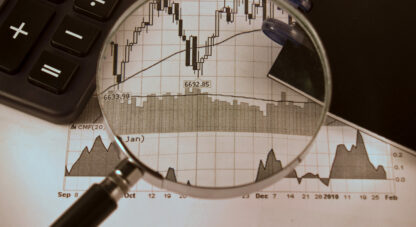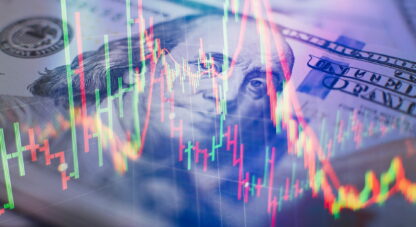A Look At This Weeks Show:
- Exponential growth is different from linear growth. We naturally think linear yet the current situation is exponential.
- Growth and prosperity are also different. You can have growth or prosperity, but not both perpetually.
- Problems and predicaments are different as well. A problem can be solved to avoid a certain outcome. A predicament has no solution, only an outcome. We currently have a predicament that we must adjust to.
About the Guest: Dr. Chris Martenson is an independent economist and author of a popular website, ChrisMartenson.com. His Crash Course video series explores the intertwining significance of the “three E’s”—the economy, energy, and environment and offers articulate, dynamic insight into the workings of our monetary system. Click Here to Purchase The Crash Course
The McAlvany Weekly Commentary
with David McAlvany and Kevin Orrick
Kevin: David, today we have a guest, Dr. Chris Martenson, a pathologist, and a fascinating guy. He probably brought to light more understanding of the exponential function than anything that I have ever read. I have read a lot of math, but this guy actually made it real.
David: Kevin, I think I spend more time reading about finance and economics than I do about petri dishes and bacterial growth, so part of the reason why it was particularly different and fresh was because it was from a different field. I think this is one of the things to point out: Chris is one of those guys who has been able to transition from one particular field of thought, pathology, into something very different, specifically, economics, and the tie-ins, when you are looking at energy, the environment, and particular inputs into our economic system. He does it well. I think a part of the reason he does it is that he does it on an interdisciplinary basis.
He wrote a book called The Crash Course: The Unsustainable Future of Our Economy, Energy, and Environment, and it is a great summary piece. It is a summary piece because there are a lot of things that we have discussed in the commentary, there are a lot of things that we have read about elsewhere, and I think as an introduction to a lot of these issues, he does a great job in bringing it together in one source.
Kevin: One of the things I like is that he practices what he preaches. We have been talking about how this debt, this monetary system, this environment, energy, whatever, is unsustainable at the rate that we are using it at this point. We already know that. They raised the debt ceiling and everybody is just looking at this saying, “Come on, really guys? This isn’t really even affecting the real problem.” And you have been bringing this out, but when Martenson figured this out, he downsized. He changed his life. He did the things, step by step, that we talk about with our clients – simplifying, and getting out of debt, and getting tangible assets, and getting land, and having some sort of sustainability.
One of the things that I really liked about his book, Dave, was that he said, “Look, anything you do is probably going to be insufficient, but do it anyway.” He said you need to be doing something. You and I have talked about this before. One of the things that make people freeze in their tracks when they see these huge, looming issues, is that they think, “Oh, my gosh, well this is completely unsurvivable anyway, so I’m going to do nothing.”
David: Well, moving beyond paralysis, Kevin, I am reminded of Aristotle’s comment that human flourishing is found in action. I respect that about him. I respect that he saw the issues and adjusted his lifestyle, and is now in a different environment and taking a different approach to life, in total, for the benefit of himself and his family.
Kevin: I am really looking forward to your talk with him. He not only did what he said he was going to do, but then he published it in a way that is very understandable to any reader.
David: There is an idea that Chris Martenson brings up in his book, The Crash Course, and I think it is worth mentioning. What is a world worth inheriting? I think it is an appropriate idea to keep in mind, and particularly important in an age like ours, one that tends toward narcissism. It serves as a reminder of both ethical and moral responsibilities to coming generations, and it helps us make choices in light of oughts – things that we should keep in mind – imperatives.
We could take a comprehensive look at your efforts, Chris, over the last few years. You are well-versed with many different issues, and we will look at a wide range of topics. I do want to take the opportunity, as we have you on line with us today, to reflect with you on a number of concepts I found particularly interesting, and just allow the listener to gain an appreciation for Chris Martenson, Ph.D. – you – the man, the person. I will assume right away that our listeners will be ordering your book for a detailed discussion of the issues which you have prioritized in that book, specifically, the economy, and energy, and the environment, and you do a very good job there.
So, without further ado, I want to begin with one of the ideas early in your book – identifying false narratives. This seems to be a major issue because, for many people, they get very excited about a particular thematic, a particular cause, and it seems they may, in fact, be misguided. Some of that is because of the news media, some of that is because of educational biases, but some of that is just flat being misinformed.
Let’s talk about that, like looking at a map before beginning a journey. Let’s talk about false narratives.
Dr. Chris Martenson: Well, it’s just so important. And by the way, thank you for that lovely introduction. Narratives run our lives, whether it is our personal lives, or if we are talking about a corporation, or a whole country. Stop me if you’ve heard this story before: “Houses always go up in price.” We had that narrative. It ran all the way up until about 2006, 2007, depending on where you lived. Whole pricing models were built off of it.
The risk models that I was looking at from Moody’s didn’t even include the possibility of negative returns on houses when they were looking at the risk function, so there was that story. And it was just a story. You could look at history and discover that it wasn’t a true story, but it was widely held, deeply imbedded, and as a consequence of believing and holding that story that houses always go up in price, a lot of very bad mistakes were made. Investments were made, houses were built that shouldn’t have been, money was poured into places it should have been, risky loans were packaged and sold off by people who shouldn’t have bought them, etc.
So when I say we have to have the right narrative in place, if you have the wrong one in play like we had with housing, that is a very damaging experience. So the question I try to raise is, what other stories do we have running today, that maybe deserve to be questioned, because if they turn out to be false, we would be in much worse shape for having believed them?
One of the biggest ones out there that I think is just starting to emerge for most investors is this idea that we need to be able to grow our debts, our economy, our money supply, exponentially, forever. That’s a story. We always want more growth, we need economic growth, we’ve told ourselves that, we’re holding that story, that’s the highest level story we have economically, we need to get it back soon.
The most recent Treasury statement by Geithner had, I think, 41 references to growth in it, and nobody really questions it. One of the things that I have been doing lately is asking the unthinkable, which is: What happens if we can’t count on growth in the future like we have had in the past? Well, all sorts of pricing models for stocks, indexes in particular, and aggregates, bonds, the whole universe of bonds – all of the pricing models go right out the window, and so do the risk models – right out the window.
Perhaps it is an unthinkable concept, and maybe I’ve got it wrong, but I think people, at least, deserve to consider it, and understand the theory that goes behind why it might be that we are at a place where growth, as we’ve known it and enjoyed it over the past decades, is not going to be an available option to us for the next few decades.
David: That is certainly an easy concept to sell, exponential growth, ad infinitum, in the future. Consumerism is an interesting overlay to that issue, wherein people either falsely assume a relationship between stuff and happiness, or even when we witness individuals escaping the drudgery of life by owning more material goods – again, the false narrative of finding one’s identity in one’s possessions or material goods. False, indeed, but it is an interesting thing – we can afford more, we can buy more, we can add more stuff, when we assume that we are on the exponential growth curve from here on into the future.
Chris: Absolutely. Just to make it very personal, if I am under the assumption that my salary is going to go up 10% per year, from here into the future, forever, I should have no problem taking on 5% more debt year over year. The story works very well, until we have questions about our income flattening out, and taking on more and more debt, particularly in pursuit of goods that are simply going to be consumed, debt taken on for the purpose of consumption rather than for investment or capital improvements.
I am not a guy who says all debt is bad, but there are types of debt, particularly non self-liquidating debts, the debts we take on to simply consume – those are the ones that you really have to keep a careful eye on, because there is an assumption baked into those that they are going to get paid back, and that when they are always growing, the future is going to be much larger than the present. Those are the pieces that I am convinced aren’t really true anymore.
You have raised a really good point a couple of times here. For me, happiness is wanting what I have, not having what I want. It is being satisfied with what we have. Certainly, in my own life, I have managed to really deconstruct my life, taking my standard of living way down. I’ve cut my standard of living maybe in half: Smaller house, older cars, got rid of the boat, all kinds of things. I did things that reduced all that, and I think my quality of life has doubled. I’ve discovered, in my own life, that there is no direct connection, for me, between stuff and happiness. In fact, I think the correlation is inverse, past a certain point.
Getting back to that idea of narrative, if you hold a narrative in your head that losing your stuff is going to be a bad thing, it will be a horrible experience. You will not like it. If you hold a story that says, “Wow, if I can pare down the amount of stuff I have and I will be happier as a result,” you will love the experience. The same thing is happening in both cases, but in one case, it is a really miserable experience, and in the other case it is a really lovely experience.
This is where I think we are. I think we are at the point where the physical dimensions of where we are in terms of amount of debt, in the oil story, and peak oil, and the amount of resources that are out there, and the competition for food, minerals, all that – we’re at this part of the story where those who are armed with the idea of how to be happier on less, I think, are in a better position to win, to feel better and navigate this next decade.
David: Chris, it was about ten years ago that you mentioned taking stock of your current income and saying, “What happens if I increase it 10% per year?” I did that very thing about a decade ago also, but to that equation, I was attaching how much more of a percentage of my income I could save, moving, not from a standard 10% or 20%, but continually ratcheting it higher and higher as I went.
That brings me to the second concept, and this is actually a concept from my initial introduction to you, when I thought, “This is a really bright guy. Who is this guy with a Ph.D. in pathology, and somebody who has an MBA?” Lots of people have MBAs, but I appreciate this multidisciplinary approach in which you are sitting there talking about petri dishes and bacterial growth, and tying in what we know in economics as the Rule of 72, or just in mathematics, what is sort of an exponential function.
That is essentially what I did ten years ago, I said, “No, I really would like to see a higher savings rate, and a greater investment thematic in our family,” and that Rule of 72 is what I was familiar with. You just put it in a very elegant, and I guess it is amazing to call what you would find in a petri dish elegant, but that was my impression. I thought it was absolutely brilliant. Maybe you could tell us a little bit about the exponential function, the difference between linear versus exponential growth.
Chris: I would be happy to, because I think this is really one of the most important concepts. We don’t live in a linear world, linear meaning we might grow something from 1 to 2, and then from 2 to 3, and then 3 to 4, and 4 to 5, so we are just adding 1 every time, and the amount doesn’t change. What we have in our whole world around us, whether we are looking at the number of people that are coming on board every year and occupying this planet, whether we are talking about the number of paperclips sold, road miles paved, or the economy, what we are talking about is something that grows by some percent every year – maybe 1%, 2%, 3%. They are very tame sounding numbers.
You and I wouldn’t race down to the store for 2% off on jeans, right? So 2% might escape our notice as something that is important, but human population is growing at about 1½% right now, and that means 78 million new people on the planet this year compared to last year. That is equivalent to five or six New York Cities.
Exponential growth, then, is really anything that is growing by some percentage per year, no matter how tame, even if it is just 1½%. What it means is that we take last year’s stock and we grow it by some percentage – everything that was there last year plus 1, 2, or 3%. When we do that, if we put that on a chart, we have this thing that looks like a hockey stick on the chart. It starts out low and flat and it turns up very rapidly.
This isn’t some arcane mathematical concept that needs to be discussed in the ivory towers. This is the world we live in. We are surrounded by exponential charts, whether it is soil erosion, or the amount of fish taken out of the ocean, or it is growth and debt, or it is the money supply. They are everywhere. Understanding that we live in an exponential world is part one. Part two is trying to get our heads around what that means, because we are not wired to understand exponential growth, intuitively. We are humans. We think linearly.
Here’s an example. If I gave you two erasers and asked you to put one in each hand and hold your arms out as wide as you could, and bring those two erasers as close together as you could, as smoothly as you could, you would do a great job. Now, let’s replace those erasers with two very strong magnets. You would do really well right until they got close and all of a sudden, boom! They will come together really fast, because the pull between those magnets is not linear, it is exponential. I will give you a hundred times to do that, and if you are like everybody else, you will still not quite be able to get it right, because our brains aren’t really wired for it intuitively, so that means we have to spend a little bit of time wrestling with this as a concept, intellectually, to really get it in our bodies.
I have found that most everybody who goes through that part of the book, or the online crash course, which is in video form, finds it to be a really helpful chapter, because it helps to understand the main concept behind exponential functions, which is that they really speed up at the end. It gives us some important context for the world we live in, where if it seems like things are going faster, technology is changing so fast you can’t keep up with it, there are more rules than you can possibly follow coming on every year, and look at the change and the speed of the changes that are going on around the world, and all around us. All of that is being driven by this exponential behavior. It is really a part of understanding the world we live in.
The third part that I like people to do is understand the implications of that, because nothing can grow exponentially forever in a physical, finite world, or planet, and we happen to be alive, I am convinced, at the most interesting point in human history, when many of these exponential curves are going to flatten out, and maybe even reverse, and this is brand new. We don’t have experience with this. We don’t have historical knowledge. We don’t have any financial models.
We don’t know what happens, frankly, anybody, myself included, when you take an exponentially based money and debt system, and then run that headlong into a bunch of exponential curves for resources that cannot keep up with the demands being placed on them. This is brand new territory. It is why I say there are huge changes coming. We need to be ready for those changes. We need physical readiness, financial readiness, emotional readiness.
All kinds of things are going to shift. That’s the view I bring forward into the world, and for me, change is not scary, it is something to be embraced. There is as much opportunity in this as there are frightening challenges, but the difference between occupying those two places is seeing these changes before they actually get started, and being positioned before they get underway, because exponential functions really speed up at the end. That’s the thing.
David: Going back to your initial idea of identifying false narratives, one of the things that you suggest is that you organize your response and categorize this as an opportunity, when and if you have started with an awareness of actual problems and deficiencies, number one, secondly, having deepened your understanding of those very issues, and then thirdly, having crafted intelligent responses to the issues as you understand them. So, there is a proactive stance. This is not sort of a resignation, if you will.
Other examples of exponential growth that come to mind: Zero to 1 trillion in debt until the Reagan administration, and from Reagan until now (laughter) it has grown a bit – 14 trillion, officially, on the books, with the debt ceiling being raised several trillion here recently, and we will fill that gap in a heartbeat.
Inflation in the ’70s. We watched this pattern as we went from tame inflation of 2%, 3%, to 6%, 8%, 12%, to 16%, and it happened very, very quickly. It was something that went from zero to 50 in five minutes, and then from 50 to 300 m.p.h., you were there in a blink of an eye.
It is something that we have encouraged our listeners to keep in mind, too, because we are approaching that kind of a phase with a number of different markets. The debt markets come to mind because that is in the news. The precious metals markets have done very well for ten years, but it has been a very steady two steps forward, one step back, behavior – modest, measured growth. At some point, we will begin to see a parabolic rise in the price. You point out that there are also concerns in terms of energy consumption and a basic disjuncture between the supplies and overall demand. Which do you tend to focus more on? The supply side, demand side, or maybe you want to explore energy with us a little bit?
Chris: It is a great question. I look a little bit more on the supply side, because I am convinced that whatever supply comes out of the ground, there will be demand for it. The demand is sort of the plug factor, here, and that is new. That used to be inverted. Demand was what you would have to track because then what we would pump out people could consume. That is shifting now.
There was a fascinating article in the money and investing section of the Wall Street Journal yesterday. It took the top seven oil companies and said that all of them had declining production last year, and then they gave this litany of excuses for each one. “Well, there was the Libya situation, that took down these two companies. And oh, there was unrest in Nigeria. And wait a minute, BP hasn’t really recovered from the Gulf situation.” It gave all of these reasons, and it is fascinating, because not once did they mention the real reason, which is that, yes, they have trouble in some of those spots, but these companies occupy every corner of the globe, there have always been issues like that somewhere at some point in time.
What hasn’t been true in the past is that there are other fields in the non-troubled areas which are not past peak production, which are not in decline already. Norway fell right out of the top rankings with a plummet. Their fields are collapsing, if I can use that word, at 11-12% a year, just really a stunning decline. Mexico is going to get there shortly.
We can go through the whole list, but we don’t need to, because what is happening here is that all of the existing fields that we get cheap and easy oil from, all of them, with the exception of a couple in the Middle East at this point in time, are past peak. So I watch that supply side a lot, because the supply side is going to be the place where we are going to first, as a nation, and then as a globe, come to grips with the idea that there just isn’t as much as we would like.
There will be some price rationing at first, there might even be physical rationing second of all, but the event I am looking for is: What happens when the world suddenly utters those two words together -- peak, and oil – openly, in the international sphere? I think things change very rapidly. I think there is a dividing line in history where we say there is Before Peak Oil, and then there is After Peak Oil. Before Peak Oil, we thought of the world this way, and After Peak Oil, we thought of it that way.
I watch supply every carefully, because we say there is around 88 million barrels per day being produced globally. That is one number, but the number we really care about is that about 35 million barrels come up and go across out to the oceans and are available for export. So it is really the export markets I am watching very carefully in all of this, rather than the much larger overall number, because what we care about, obviously, would be peak in our country, here, where we import two-thirds of our oil needs – we care about the export market more than we care about how much is available in total in the world.
We have two exponential functions working against us. One is declining production in a lot of countries out there, and at the same time, rising demand internally in each of those countries, and that is true of every country – Saudi Arabia – all of them. When you have some percentage of decline every year, and some percentage of increase in local demand every year, those are two exponential functions pinching on what is left over for export.
That is why I am watching that export market very carefully, and there are all kinds of warning signs out there now, that anybody who cares to, can find easily. I honestly think it is the thing we should be focusing on more than the debt drama in D.C., because I think it has more powerful and lasting implications and impacts on our daily lives, as we go forward, than the debt drama.
David: Let’s try this on for size. Let’s say that the cheap and easy oil, that access is now behind us, and we are on a declining trend. But we would both agree, and I think argue, that we are also getting past that point of exponential economic expansion, exponential growth in the economy. Even today, we are trying to prop up aggregate demand here in the United States with a GDP number of over 14 trillion dollars. Deficit spending by the government, today, has stepped in and replaced the consumer, to the tune of what this year might actually be close to 1.7 trillion dollars. We are trying to hold up the façade of “growth,” even when it is already past tense. The question is, if that economic expansion and growth is past tense, isn’t energy a lesser issue, as demand decreases?
Chris: One of the issues here, though, is that oil demand is really, really, inelastic. The economy can plunge quite a lot. Global trade was down, I think, in 2009, almost 40%. Oil demand was down, too, but it was down by about 4%. 95% of everything that goes from point A to point B moves because of hydrocarbons, because of petroleum.
If want something to go from point A to point B, there are a lot of things involved, regardless of whether the economy is doing well, or poorly. We still need the food to move from point A to point B, most people haven’t lost their jobs, they still need to get to work, and it turns out that, from my point of view, oil is really a nonnegotiable lubricant of all economic progress. Even if we held our economy dead flat, zero percent growth, and we were not going to have any economic growth going forward, our oil demand would still be there, and still be there relatively strongly.
What happens in that world that you posited, where economic growth is leveling off, flattening out, but we don’t have sufficient supplies? Prices are going to go up. Think of it as a giant spigot where we pull this oil out of the ground and we can do whatever we want with it, and as the cheap and easy oil goes away, we are left with this harder stuff? The Deep Water Horizon was in 13,000 feet of underburden, plus 5,000 feet of water, and that is not even close to the deepest ones we are drilling. We are going after this heavy tar stuff that almost has to be taken out of the ground with a spatula. It is just really not the beautiful stuff that we first had access to.
What is happening is that instead of pulling up all this oil and just sending it out into the economy to be used however it wants, it is taking a larger and larger share and turning it back on itself to fund, if you will, the higher energy intensiveness of getting this lower quality energy out of the ground. As we do that, it means we just have less left over for society to do whatever it wants with.
This is really part and parcel of why I believe we have thrown trillions of dollars into the economy and it is just not working like it used to. Part of that story is the big debt overhang – that is creating a drag. I think another significant and growing part of that story is the degree to which there is just simply less energy available blowing into and through these economies for that money to go and catch hold of, and light on fire, and do fun stuff with.
It is really an important concept. It is the concept of how much net energy we have left over. We take some energy, we find some energy. Whatever is left over in the gap between those two, when we subtract one from the other, is our net energy, and that is declining.
That is where we happen to be. If we had really good data, which would be fabulous, but we don’t, we would be able to track the net energy we are getting out of all of our efforts in the world. We don’t have that, so we track how many millions of barrels we are actually getting. But that is hiding a really important part of the story, which is that, as we move to these more expensive, lower-grade hydrocarbons, we are going to discover that we just cannot operate our economy in quite the same way we used to.
That is not a big problem, because we could reorganize it. The problem is, we have our leaders, our monetary fiscal authorities, attempting to preserve the status quo, wanting us to get back to how things were functioning, which is a totally normal response on their part. They were trained in it, they were raised in it, and they can’t see the forest for the trees. I totally understand what they are doing, but they are going to be, and we are going to be, increasingly disappointed with how things are not responding like they used to, how things aren’t working like they used to, how things are mysteriously remaining broken and we don’t understand why.
It is because you can’t just look through that one economic lens any more. You can’t just look at monetary policy and understand what is about to happen next. It is a large, complicated system, and energy is a really important component of that system. In fact, I would argue it is the base of the pyramid of the system and the economy is actually secondary to the energy foundation. Once we hold that view, a lot more things begin to make sense. What we are seeing in the world today, I think, is more predictable and understandable once we get that view locked in place.
David: There are three other concepts that I think are incredibly beneficial in terms of changing the way people see and perceive things around them, and maybe even their own personal circumstances. One, you suggest the difference between growth versus prosperity, I would like to talk about that, and in a minute, also talk about the hierarchy of wealth that you lay out between primary, secondary, and tertiary forms of wealth. And then, as we close, maybe looking at the difference between a problem versus a predicament, defining something of a course, a way forward, what we talked about earlier – an opportunity. How is radical change something that is to be looked forward to, or at least anticipated and adjusted to?
Starting with growth versus prosperity, in 1965 14% of the population here in the United States lived below the poverty line. Today, after massive economic growth, there is 14.3% of the population still living in poverty. That is commentary on many things. But focus on that same theme, growth versus prosperity.
Chris: I like to decode those two words and separate them, because we see growth elevated and exalted in the language. If you open up the New York Times, or the Washington Post, there will be some economic guru or political leader talking about the importance of growth, and they never really explain why we need that growth or why we would want it. It is just accepted. “Of course we want growth.” “Well, why do you want economic growth?”
We actually want economic growth because we have more opportunities then, and it ends up with new technology, so I think what we mean is, we actually want more prosperity. I don’t really care if the economy grows a million percent, I want to be more prosperous next year than this year. Because we have had both growth and prosperity for so many decades happening together, I think a lot of people have confused the two and thought that the way you get prosperity is to get growth first, and with growth comes prosperity, but they are actually separate concepts. We can easily have growth without prosperity.
You mentioned one example. Look at all this economic growth, we have had lots of it, and poverty is still pretty much the exact same percentage it was 50 years ago. There are countries with huge, giant cities that have grown enormously, but you would be hard-pressed to describe them as prosperous cities. Growth can happen without prosperity. That much is clear. And we can also have prosperity without any growth. Even though I have cut my expenses back pretty far, and trimmed down a lot of the stuff that I have, I personally feel more prosperous.
Let’s decouple these things and understand that what we really want, I hope, as a country, and as individuals, is to be more prosperous. I want my children and their children to grow up in a world with more opportunities, not less. I am convinced that if we just pursue growth without being mindful of what we are really after, which is prosperity, we will get growth. That is what we will get, but it is not going to be what we want.
What we will end up is growth for its own sake, and we will discover that we actually live in a world that is not nearly what we would have intentionally created if we had had the right narrative in mind, the right understanding around those words. I tease growth and prosperity apart a lot. I am convinced that growth becomes destructive when you attempt to grow in an environment where the growth is now stealing from your prosperity, because you are spending your last valuable resources to make things bigger, but not better.
David: Our economy is obviously predicated on growth, and I think some of this goes back to the elimination of the business cycle, as a consequence of adopting, or at least allowing, a Keynesian consensus to be what dominates our, not only political theories, but certainly monetary thematic. Fed intervention is there at every step. When there should be a correction in the business cycle, we re-liquefy, and re-liquefy, and re-liquefy, because we really don’t want to see the dark side of a deflation, or the dark side of a devaluation.
It is just not something that we particularly like, and maybe that has been seared into our minds with memories of the Great Depression, but we are fixated on the opposite, which is growth. I think one of the things that misses, and you do point out in your book is that it is natural for things to ebb and flow, is that it is natural. And when that doesn’t happen, when there is not seasonality, you end up distorting growth to something that ultimately dies because it never got to take a breath. It never got to rest.
Transitioning themes now, you define money as a claim on wealth, and that is a very unique definition of money. Often people will look at the characteristics of money and what constitutes money – it has to have this quality, and that quality, and this quality. You are defining money as a claim on wealth, simply an instrument used to exchange for real wealth. Maybe you can talk to us about those tiers of wealth, the primary, secondary, and tertiary.
Chris: I would love to, because I think this is a big theme that is going to be emerging, and it actually already is. We can see the steam coming out, and here is how I will explain it. Once upon a time, people’s wealth was easy to measure. It was how much land you had. In the landed gentry and royalty, the more land you had, the wealthier you were. That was easy to understand. If you had rich soil, you could farm it or have somebody farm it for you, and that rich soil, then, is your primary source of wealth. It is just sitting there, it is not really doing anything, but you have that rich soil, and so you farm it.
You can take that primary wealth of the soil and turn it into secondary wealth, which would be something that we would transform out of that, so in the case of soil, we grow corn. We take the corn and turn it into flour – all physical, tangible representations of secondary wealth – and the real wealth is in the flour that comes out of that, or the corn meal, because we can eat that, and it has actual utility.
But we learned early on that bartering corn for leather didn’t always work out well, and we came up with varying forms of money. Money is an abstraction, then. Money is a claim. We agree that this money that I have can be exchanged for something that you might have. So money, itself, at one point, was also very tangible. It was hard metal, silver and gold, things like that, which, themselves, embodied an enormous amount of human labor to get up out of the ground and out into circulation, so it both had energy and effort and implied rarity, all baked into it, so it was good as money.
Here we have this primary wealth, whether that is rich ore bodies or fishing grounds, or the soil I mentioned, or trees, or whatever, and then we convert that into secondary forms of wealth, which is lumber and steel and food on the plate. Then we built up this third order, or tertiary wealth around that, which is all the paper money that we have built up.
Right now, I would daresay that our society is fascinated with that tertiary wealth. That is how we know how wealthy someone is. How many of those paper dollars do they have? Or how many of these credit default swaps is that person managing? That is how we measure everything right now. But in truth, if we didn’t have primary wealth, there would be no secondary wealth to be had. No soil – sorry – no food. And without food, the tertiary wealth has no meaning. It literally has no meaning. It is an abstraction.
Once we have this view, we can say that primary wealth precedes secondary wealth, and both of those have to precede tertiary wealth, that in fact, money, itself, doesn’t make these other two things happen or exist. Money, itself, only has meaning and value because these other two things are in place. I think that once upon a time that was really well understood. Nobody confused money and wealth at one point in time. I think we have confused it a bit and we think that money is wealth. In fact, money is only wealth if it can do something for you, or if it can lay a claim to, if it can possess, or in some way consume, one of these primary or secondary sources of wealth.
That is the great pendulum, I think, that is starting to swing back. I mentioned there is early evidence of that. We can see that with farm land prices. We have found out that Goldman-Sachs has been stuffing warehouses with aluminum, and that the great commodities boom is on. If you look at the continuous commodity index from 2002 to today it is just an absolute rocket ride, compounding it a little over 14% per year. This represents, I think, at least the early stages of this tertiary wealth looking for something to do, all this paper money looking for something to do, and starting to squeeze back down in through some fairly narrow doorways into secondary and even primary sources of wealth.
David: That’s a great contrast between the independent source and the dependent claim, and you make this point: Our money, debt, stocks, and bonds, have a high value in a world of constant economic growth, and a much lower value in a world without economic growth. If that, in fact, is the case, we are reaching the point where exponential growth is exhausted, and cannot continue.
Markets still seem to be pricing in a return to that old normal, where tertiary is just fine, thank you very much. If you look at the valuations in the stock market today, they would imply that people still have a tremendous amount of faith in stocks and bonds. It will be interesting to see, as people awaken or realize that it actually is nothing but paper promises to pay: Where do they go, and what does their buying behavior look like?
I am curious about this contrast between a problem versus a predicament. Problems have solutions, predicaments have outcomes. Maybe you can just tell us about the difference between looking at one versus the other. Do you see us in a predicament, and how do we factor in a strategic plan from this point forward?
Chris: It is a critical distinction, I think, because often I hear things phrased in terms of, “Here are some problems, and we’re going to solve them.” I love solving problems. When there is a problem, I’m the first guy out there to start banging around on solutions. That’s all well and good, but the difficulty is that sometimes you are actually facing a predicament, and predicaments don’t have solutions. They just have outcomes.
For instance, looking at the aging baby boomer population, this isn’t a problem, it is a predicament. There are going to be fewer people behind that bulge paying into what is basically a pyramid scheme, and that is a real predicament. There is just no combination of laws we can pass that will change the fact that there are now more retiring people than there are wage-earners right behind them. That is just a predicament.
We are surrounded by predicaments right now. Our country peaked in oil production in 1970. We have the best technology in the world – we have slant bottle-brush drilling, we have all this fracking – we have incredible technology, and we have never been able to even remotely get close to the old peak of nearly 10 million barrels per day in 1970. Today we are at a little over 5½ million barrels.
It’s just a predicament. If it was a problem, the solution would be to drill more holes and get more oil out of the ground. That’s really not a realistic solution because that is not what we are facing. The predicament is that we took more than half of all the oil out of the ground and there just isn’t that much down there any more. It doesn’t matter what we do.
Right now I see in the D.C. debt debates that they are treating a predicament as if it is a problem. “Well, the consumers aren’t borrowing, and that is a problem, so what we will do is have the government borrow instead.” There’s a nice problem with a solution: Lack of borrowing, government steps in, does the borrowing. Sounds great. Keynesians love it. That’s how you do it.
What if the predicament was that we were actually suffering from too much debt, and the only way to solve that, such as it is, is through the outcomes of getting to a lower level of debt – increasing savings, foregoing consumption, and tightening our belts?
If we were facing too much debt, and we decided to treat that with a solution of applying more debt, you will find out that, in the end, you’ve done a couple of things: First, you have wasted everybody’s time, and time is one of our most valuable assets right now. The second thing is, often you make what it was you were attempting to fix worse, because you are applying a solution to a predicament.
That is where I really feel very much out of step with the current crop of monetary and fiscal authorities. I keep seeing them diagnose things wrongly, in my estimation. I see them trying to fix things which are inherently unfixable. And they are committing the grievous sins of wasting both time and resources. That is the world we are in. I feel out of step with that, a lot of people feel out of step with that. I think that is where the angst many people feel right now is coming from. They are looking at this thing, they see what they are doing, and it just doesn’t square up with their reality, or what they understand to be reality.
So what is the problem here? Having this understanding of the difference between a problem and a predicament can be a key to understanding why that disconnect is there and why we feel uncomfortable with what we are seeing.
David: Then if we have predicaments in front of us, what is your suggestion in terms of how to optimize a response?
Chris: A predicament really requires an intelligent response. What we need to do is figure out what the possible outcomes are, and which ones we want to navigate toward. For instance, if I had a magic wand and was able to run things for a little while, instead of giving a trillion dollars to the bankers and letting them repair their balance sheets, I would have applied that same trillion toward building up the infrastructure we need to make use of our natural gas resources that we have, understanding that the predicament is that we are going to have to figure out between here and there – there being two decades away – how to transition from the amount of energy we have to a lower energy lifestyle.
Can we do it? No problem! Europe lives on half the energy per capita that the U.S. does, and they live just fine, so I am sure we can get to a lower energy point. It is going to take a lot of money, it is going to take a lot of investment, but first we have to understand we are in a predicament, and that we cannot rely on world global energy markets to supply us with ever-increasing amounts of the kinds and types and qualities of energy we want forever. We happen to have resources right now. Instead of wasting the time repairing bank balance sheets, what if we built up our own domestic infrastructure, created all of those jobs around that, created all the investment opportunities, and started to learn, on our own terms, how to live a lower energy lifestyle, in ways that we wouldn’t even experience as disruptive?
Instead, we are going to try to get ourselves back on growth, we are going to pile up the debt even higher, we are going to ignore this looming energy crisis that is there for anybody who cares to look. We are going to plow into that new reality at fairly high speed at some point in the future, and then we will have to go into damage, triage, emergency-measure kind of stuff, which isn’t pretty, and never optimal, and not quite what anybody would have willingly chosen if they were presented with the option in an appropriate way.
But first, we have to get the right narrative, and in this narrative, we don’t face an energy problem. We are facing an energy predicament, and we’ve just got to get that right, or, in the future, we are going to get it wrong.
David: One of the narratives we have experimented with here in the last few weeks, is treating this as a true turnaround situation. If you look at a corporate turnaround, time is, as you say, a most valued asset, and you would have to identify properly what the issues are. You also have to look at the status quo with a different and fresh set of eyes. Oftentimes in a turnaround situation much of the upper management is fired, because they are a part of the problem – predicament, problem, however, you view this. They represent the status quo, and they have lacked, for a long time, the political will within that organization to change things. We live within a democracy where we are somewhat constrained. No one can step in and fire 535 people, but how do we approach the status quo and say, “No, no, you don’t understand, we are out of time?” Somebody has to make clear-headed decisions here, and it is not going to be on the basis of a group think.
Chris: I totally agree. Here is one of my biases sneaking out. I don’t think that we have time to change things through the normal status quo mechanisms, right now, even if we wanted to. The ideal time to begin navigating this particular energy space would have been probably about 20 years ago. It would have been a great time to look at this. We had all the evidence back then. We chose a different path, we decided to go for this growth model, and so here we are.
So I look at this and I say, “Look, a normal market-based energy transition takes 40 years, on average. We are going to be facing peak oil, I think, in no more than four years, as an openly discussed international concept, so there just isn’t time to wait for market forces to come around.”
So then what is left? Well, there is some sort of a forcing function, some sort of a crisis mentality that is going to take hold at some point, and in looking at that, all I needed to know about how I want to be when that arrives was given to me by hurricane Katrina. We had plenty of warning that the storm was coming. It came, it destroyed New Orleans, and that place was just an absolute mess of a response for a week or more. So, I see this big storm coming, I see relatively low amounts of official awareness around this, and so what is left is for you and I, and for corporations that I happen to consult with, and other individuals who get it to say? “We hope that the leadership structure gets this in time?” Hope, alone, is a terrible strategy, so what else can we do?
So then we want to talk about how we can mitigate these impacts for ourselves with relatively simple things that we can do that make all kinds of sense today. It makes environmental sense, if you want to look at it that way, economic sense if you want to look at it that way, lifestyle sense – there are all kinds of ways that we can make perfect sense out of taking mitigating steps today, but they are just a little bit out of the fold, they are just a little bit different than maybe what most other people are doing, and that seems sufficient to block a lot of people from taking those actions. But make no mistake, there is plenty that can be done today. Lots.
David: And it seems, with reference to Katrina, it is a healthy reminder that many of these things are mitigated, not at the macro level – there is no great big brother who is there to swoop in and solve the problems. If there is anything that we have learned in the last three years, they are very unprepared for the financial storm.
If, in fact, there is an energy storm ahead of us, as well, you are right. Lacking political will would be a generous way of describing the opportunities that they have had to make changes along the way, and their relative intransigence from the 1970s forward. Simplify seems to be a word that would describe, in brief, a micro-strategy for families to look at everything that they do, and just simplify.
The Crash Course is your book. It is a great read, I thoroughly enjoyed it. I can tell you, because we read so much in the office, there is not much here that I haven’t seen before; you just said it better. You said it in a way that was very approachable. You said it in a way that was as from an experienced teacher, with the adequate explanations and demonstrations of the fact that you know what you are talking about.
I appreciate you taking the time to explore these things through the years, in essay format, and now in book format, and I am sure many of our listeners will join in reading and processing through in their own families, how to apply simplification at the micro-level.
Chris: Fantastic. Thank you so much for the opportunity, and it has been a pleasure.
















